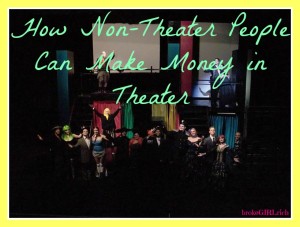Now that you’re familiar with a few of the ways I’ve side hustled – eBay, substitute teaching and mystery shopping – let me let you in on the one that makes the most money. I work overhire in theaters. Do you want to know why you probably don’t? Because that last sentence was industry speak and probably scared you away, but the fact of the matter is that a lot of you could be working overhire too.
So let’s break down that sentence into layman’s terms. Overhire is just a way of saying that you work there only when the theater needs extra help. Most theaters have a core crew that work pretty much full time for the venue or the theater company, but there are several times a year when a theater company or venue need to hire extra people. Interestingly enough, I know this process from both sides since I do work freelance as an overhire technician, but at my day job I hire the props and wardrobe folks.
Here’s a fact, if you look on theater job boards (and I’ll provide a list of them at the bottom of the page), there are LOTS of jobs you could be doing to pick up some extra cash with a very wide array of skills. And you don’t necessarily need a theater degree or even theatrical experience to do some of them.
If you don’t mind a little physical labor, you could apply to work on a stage crew. Often you’d be looking for job listings looking for overhire crew. Read the summary and if they want you to unload and load trucks, that’s really what you’ll be doing. They might ask you to put some stuff together during the load in, but here’s another secret – no one at that load in really knows how that set goes together other than the folks on the tour. If you have a bit of common sense and can screw bolt B into the hole labeled bolt B on the piece of scenery, you’re going to be fine.

This set was pretty easy to build – it was the painting that took forever. As you can imagine, painting a bunch of black and white squares is more time consuming than skilled labor. Rag rolling the platforms… that’s a different story.
Do you have carpentry skills? One of the easiest overhire jobs to get, in my opinion, is in carpentry, because lots of folks, like me, hate it. You do need to be comfortable using tools, reading plans and assembling a set. If you can do your own home repairs, you’ll probably be fine.
Do you have strong sewing skills? Overhire stitchers are often in high demand and last minute jobs pop up a lot (I know, it happens at my theater often – I hired 6 people at the last minute this week). If you’re comfortable doing basic alterations, hemming items, etc., you could pick up extra cash working as wardrobe overhire.

It took a lot of stitchers to make all those period costumes, but was it super difficult? I don’t think so.
Are you especially crafty and good at finding odd items? That’s pretty much a props person there, which is one of my favorite overhire jobs. You work on your own time a lot and just check in regularly with the production. Recently I worked on a production of Romeo & Juliet. One weekend I spent 4 hours at the theater turning a handtruck into a “cart” for the Friar with a cardboard box, a wicker basket and a shoe rack… and a whole lot of fake flowers. Other than that, I went to one meeting that the director scheduled around my work schedule, spent about 2 hours shopping and swung by once more to drop off some more props. Then I went to the final dress rehearsal for 3 hours. All together about 9 hours of work for about $400. Not too shabby. And prior to this, the last time I was entirely in charge of props for a show was 2003.

This show has a whole lot of little bits and bobbles – ash trays, bottles, pictures on the walls, etc – that someone spent several hours pulling out of stock and then several more buying at local thrift stores.
Keep in mind, I’m not telling you to apply for Broadway gigs here – but starting at little local theaters will give you an idea of if it’s something you’d like to keep doing. The smaller the theater, the smaller the pay is likely to be, but if you’re just building up a side resume in these skills, it’s not a bad way to go. And if it’s something you enjoy doing anyway, giving it a theatrical twist is likely to breathe new life into an already enjoyable hobby.
So what are pros of the working overhire? The job is very flexible. You apply for the jobs that you want to apply for and if you do well at a place, they may call and ask you if you’d like to come back and work next time they need extra help before they even post the job. The pay is usually higher than most side hustles since these are skilled jobs – or manual labor. You can usually wear jeans and a t-shirt to work (is it just me that finds that to be a major pro?).
What are the cons of the job? The hours can be VERY long. In the past I’ve worked jobs that started at 4 AM and went till 2 AM the next morning… of course, after 8 hours it went into time and a half and after 16 hours it went into double time… so the paycheck made it worth it. To me. Smaller theater companies can be very sketchy about what they want from you and paying you – not always, but definitely sometimes – and it takes a little practice to get good at spotting those kinds of gigs. There are very set deadlines, so if things go wrong, you may wind up working much longer than you thought you were going to that day. Also, I’m not actually a fan of manual labor and road cases are freaking heavy, especially when you’re trying to get them in and out of trucks. There are also times when everyone around you gets very stressed out because of deadlines and things going wrong and people looking at them funny… whatever, you name it. There are lots of egos in theater. If you can just shrug it off, it probably won’t bother you. Furthermore, everyone will think you’re an idiot until you prove you’re not. This is just the way of stagehands.
That being said, if you’re still wondering where you can find some of these jobs, here are some useful links to get your started:
StageJobsPro US (but you’ll need to make a profile)
You can also check Gigs and Crew on Craigslist for your area.
Once you start racking up the money, check out Robert G. Allen’s Multiple Streams of Income: How to Generate a Lifetime of Unlimited Wealth! to find out what you should do with it! Giveaway ends of 2/28.






This is super helpful! What is the payment/tax situation of these jobs like? Are you actually hired by the company? Paid under the table? Paid as an independent contractor?
Leslie Beslie recently posted…Working in a Factory (And knowing you could be replaced by robots)
It’s a really wide variety of situations. In very small theaters, it’s likely to be under the table. If they’re a little more established, they’ll probably make you fill out a 1099 and have you work as a freelancer. Once it gets larger, you’d fill out a W-2 and be considered a part-time employee of the theater.
This is interesting! I always assumed you had to be in a union to get a job in theater in NY. I had no idea they hired people for temporary jobs like this. What type of payment range is typical for this type of job?
Shannon @ Financially Blonde recently posted…7 Tips to Raising a Financially Fit Kid
It varies pretty widely. I’d say with sewing skills, you’re probably going to get the best hourly rate, since most houses are union and work at the established union rate, but are not required to hire only union workers. We use both here and the only difference is that we don’t have to pay all the union add ons (pension, vacation, health care, etc) for non-union workers, but they take home the same paycheck. Here it’s $31/hr.
Any house that mixes union and non-union workers, non-union workers have to receive the same compensation as union workers.
I used to make around $20/hr building sets or working electrics. If you pick up extra skills while you’re doing those things – like there are several light boards I’m comfortable programming – you’ll get paid much more to do those higher skilled activities. But you wouldn’t be likely to walk in off the street knowing how to do them.
For props or any sort of designer jobs (if you learned enough to get interested in doing that), you’re more likely to make a flat fee. For instance, my last props job was $500 for the whole job, including whatever I had to buy. For a lot of people, that would’ve worked out to a really low number, but the theater I work at most of the time lets me raid their props storage. So I only wound up spending about $100 and got 80% of the props “shopping” done during a lunch break one afternoon when I pulled everything out of storage at my day job. Granted $500 was actually a really good fee and usually you’d be looking at $150 to $200, but usually that’s a flat fee and then the company pays for all of the props on top of it.
Mel @ brokeGIRLrich recently posted…How Non-Theater People Can Make Money in Theater
Oh theater, how I miss thee. I remember the long hours alright. I think that’s why I like brand ambassador work too. There are so many ways to make money in the arts, if you can get in on the back end.
Dear Debt recently posted…It was all a lie
Share-worthy! I tried a couple similar gigs when I was younger, but the problem is that you’re ‘always on call’, which can ruin your daily plans and waste you a lot of time this way.
Heidi @ Thriftytricks recently posted…Infographic: Is It Time To Move Out?
True – it definitely depends on what sort of gig you get. I believe a lot of gigs have more set hours now, rather than just keeping someone on call all the time.
Do the overhires not need to be in IATSE? I guess it depends on the venue?
Yeah, it’s venue related. It’s pretty much the same as their being AEA and non-AEA gigs. And some houses hire a mixture of both – everyone gets the same rate, the guys in the union just get all their additional benefits (health insurance, pension, vacation days) paid into the union from the venue as well.
I think working in a theater would be really neat. I’d love to do costume design and sewing but I’m not sure my skills are that good. I had a few friends in college who were ushers at local theaters and got free tickets to show/concerts/plays etc. which I thought was pretty cool.
KK @ Student Debt Survivor recently posted…The Best $200 I Ever Spent
If you’re interested but not certain of your skill level, you could look into some of the volunteer positions at community theaters to get your feet wet.
Cool! I’m not into theatre but I briefly worked in events and got to see a concert or two while working.
NZ Muse recently posted…Friday Five: The business of car sales
Oh how interesting. When I used to give campus tours in college, I’d talk about the many music and theater groups on campus and how all students–not just theater majors–have talents to contribute to the performing arts groups. I never even considered how those non-performance roles could translate into the “real world” for some extra cash! Great idea, here. Thanks!
Meredith @ DareYouTo recently posted…Eat Eggs
What a fun way to pick up some extra cash, I never would have though of doing this. Thanks for sharing the idea.
heidi recently posted…Is Mother Nature Out to Get Us?
Interesting post. I have a full time job, but I like to work little side gigs like Ebay seller, or helping people declutter their houses. I was a lighting designer / stage manager in college and high school, but I never even considered doing something like this. I’ll have to look into it. #SITSSharefest
Adrian recently posted…Sochi Update – The Cat-lympics
It seems like a lot of people did theater stuff in high school and college and then went on to different jobs! I think that makes it an even better side hustle since it gives you a chance to get back to something you really enjoyed (hopefully).
thanks for sharing will let my teenager know about this to make a little money have a great dad and great post
lorraine williamson recently posted…Frankies Corner-Box Love
Pingback: Fabulous Female Finance Bloggers: Women's Power Wednesday - The Broke and Beautiful Life